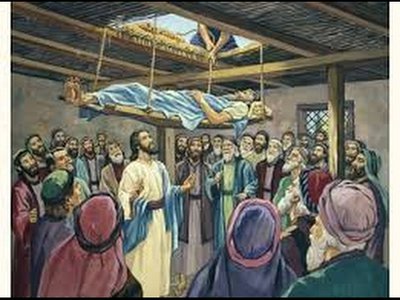Thoughts for the Day
Friday, 12th January 2024: Forgiveness and healing
Scribes Mark 2 Sin Forgiveness Jesus Healing
Reading : Verses from Mark, Chapter 2

When he returned to Capernaum after some days, it was reported that he was at home. So many gathered around that there was no longer room for them, not even in front of the door; and he was speaking the word to them. Then some people came, bringing to him a paralysed man, carried by four of them. And when they could not bring him to Jesus because of the crowd, they removed the roof above him; and after having dug through it, they let down the mat on which the paralytic lay. When Jesus saw their faith, he said to the paralytic, ‘Son, your sins are forgiven.’ Now some of the scribes were sitting there, questioning in their hearts, ‘Why does this fellow speak in this way? It is blasphemy! Who can forgive sins but God alone?’ At once Jesus perceived in his spirit that they were discussing these questions among themselves; and he said to them, ‘Why do you raise such questions in your hearts? Which is easier, to say to the paralytic, “Your sins are forgiven”, or to say, “Stand up and take your mat and walk”? But so that you may know that the Son of Man has authority on earth to forgive sins’—he said to the paralytic— ‘I say to you, stand up, take your mat and go to your home.’ And he stood up, and immediately took the mat and went out before all of them; so that they were all amazed and glorified God, saying, ‘We have never seen anything like this!’
(Lectionary, New Revised Standard Version)
Thoughts
Chapter 2 of Mark's Gospel begins with the news that the crowds have tracked Jesus 'to his home' in Capernaum. Once again a healing will occur after he has finished teaching the people. Again it will rely on the faith of those concerned. Four men have brought their paralysed friend on a stretcher to Jesus. Just imagine what it was like to carry a heavy man for some distance in the hot sun, only to find they couldn't get near to Jesus because of the crowd of people in and around the house. But their faith is so strong, and they are so determined to get to him that they climb the outside staircase to the flat roof and remove the thatch or tiles which would have been laid over the beams so they can let their friend down to the floor below in front of Jesus.
At this point the event almost descends into farce for Jesus says "Son, your sins are forgiven." His friends want the man to walk, and we can almost imagine their expressions at this point, but Jesus knows better. As one theologian has said, "What good was it if the man had two whole legs and walked right into hell with them." For whatever reason the man's sin is linked to his sickness, and Jesus knows that he needs first to be forgiven. When the scribes question his authority to forgive sins Jesus uses the phrase "Son of Man" as his evidence, with its links to the book of Daniel (Daniel 7.13-14) and to the Messiah.
Is this not why today in the Eucharist (Holy Communion/Mass) we confess our sins before we make our intercessions, when we pray for the church, the world, and ourselves? Is this not why sin is emphasised in our worship? We say or sing the Agnus Dei (Jesus, Lamb of God, have mercy on us) before we receive the bread and wine, and often use the Prayer of Humble Access (See text) with its emphasis on our unworthiness. Finally, we also say the Lord's Prayer with its mention of sin just before we receive communion. We need to confess our sin and be absolved, for only then can we be spiritually and physically healed.
Prayer
Lord Jesus Christ,
as You healed the men and women
who came to You in Capernaum and Galilee,
recognizing their need to be healed
both spiritually and physically,
so we come to You this day
and ask You to forgive us -
our unconscious and our deliberate sins,
and to heal us physically and spiritually this day,
if it be Your will.
Amen.
This amplifies the whole question of healing particularly in the New Testament, and might be of interest: